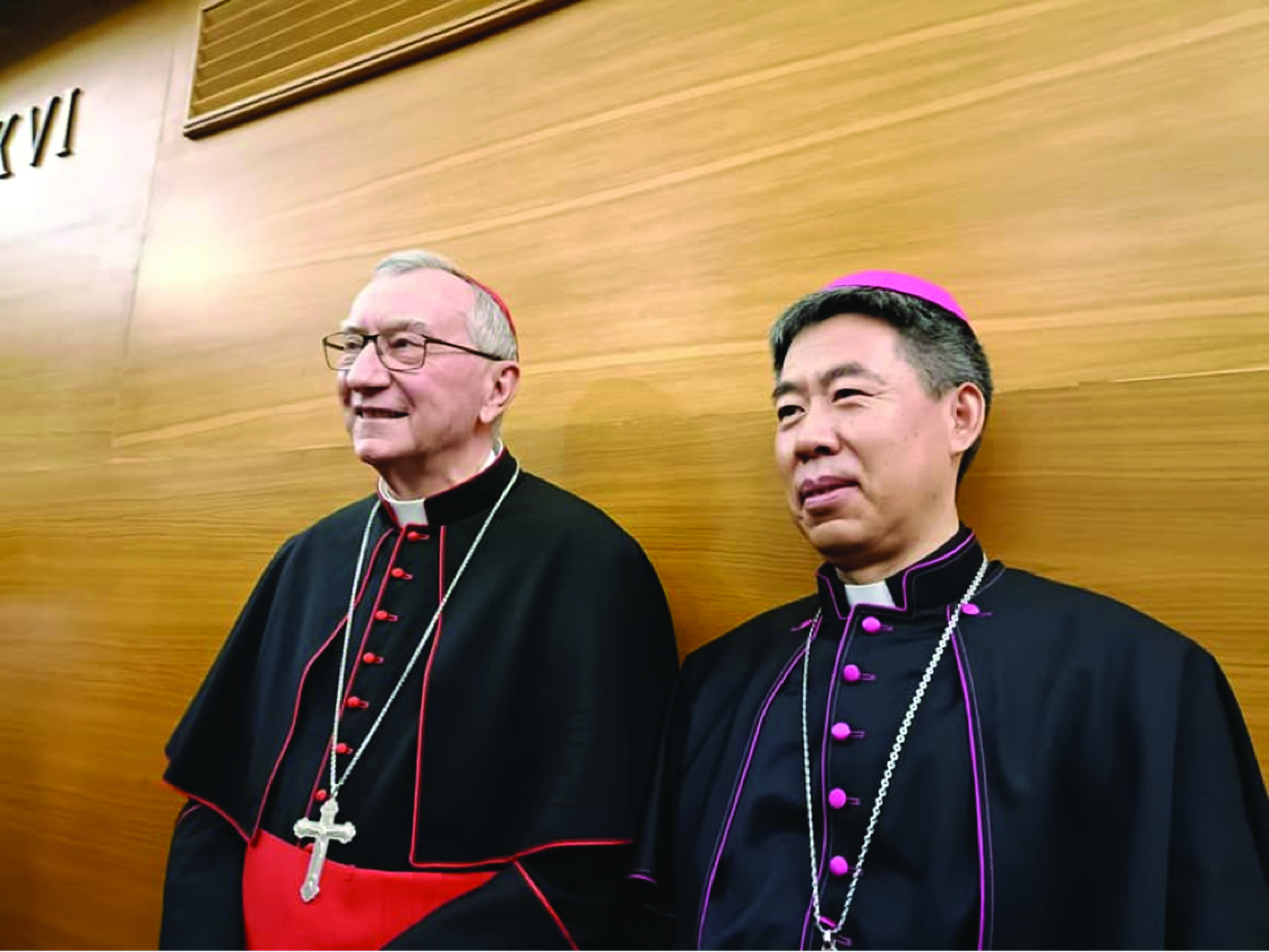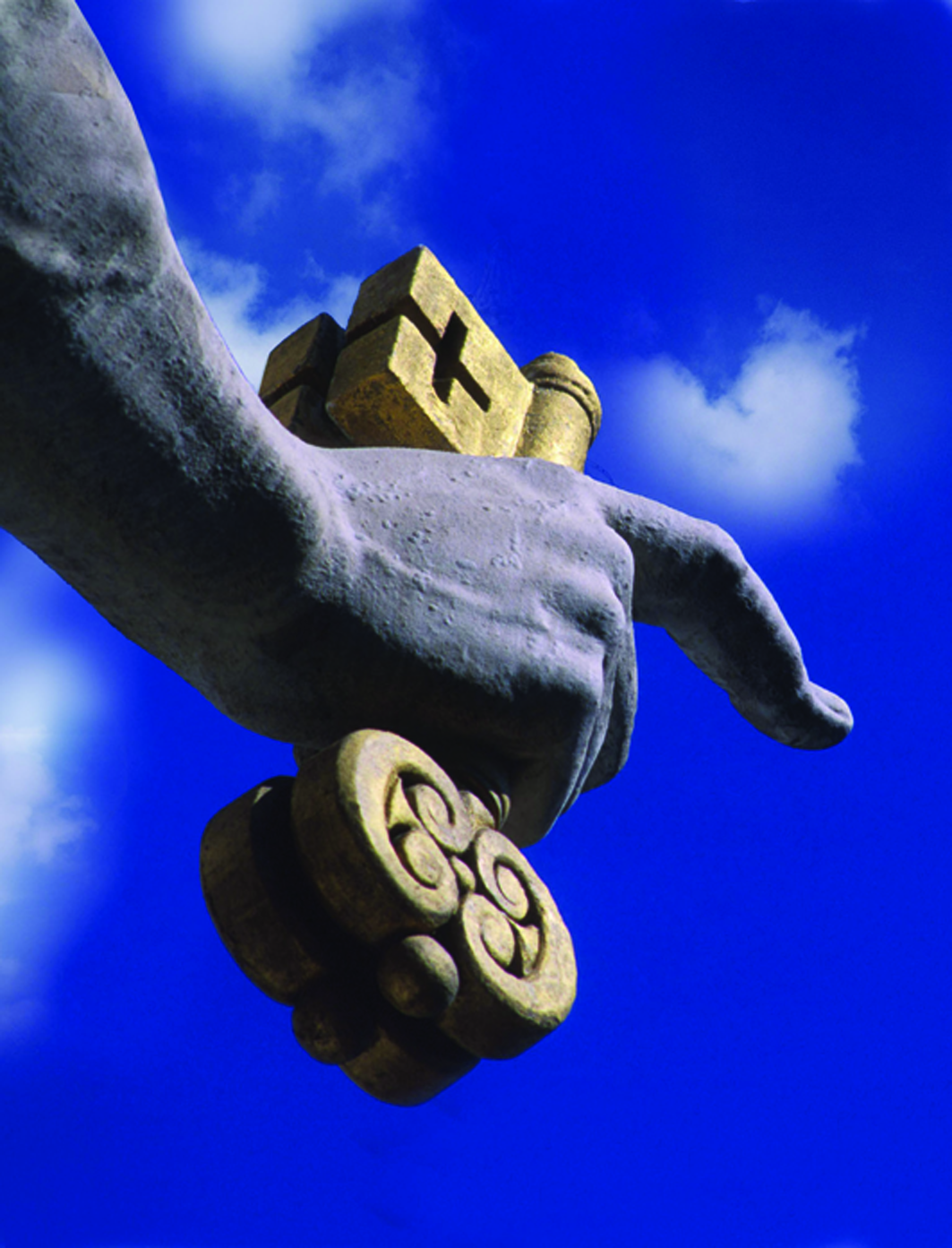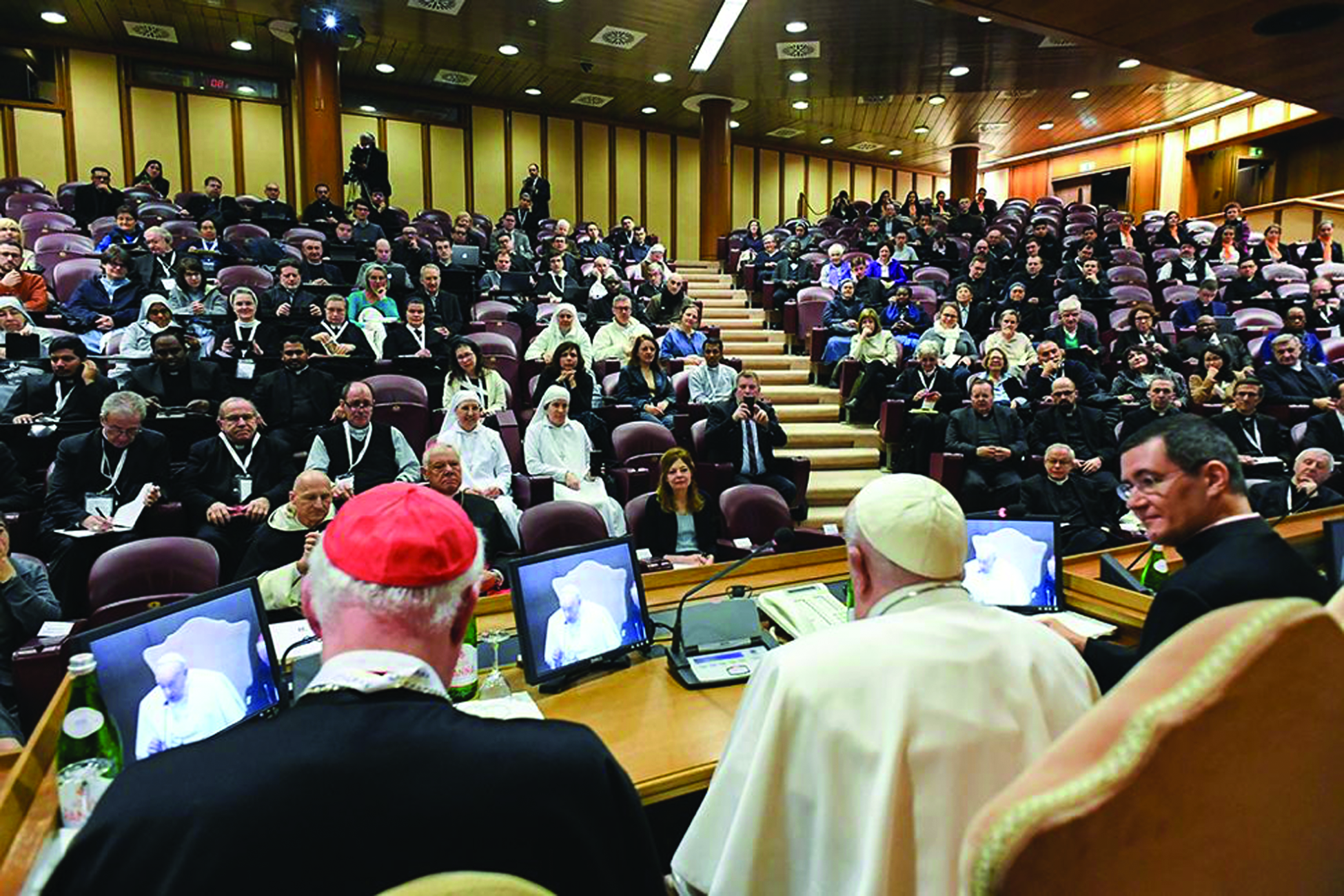
Pope Francis and Orthodox Patriarch Bartholomew of Constantinople arrive for the meeting, “Faith and Science: Towards COP26,” with religious leaders in the Hall of Benedictions on October 04, 2021 in Vatican City, Vatican. (photo: Vatican Pool / Getty)
October 6, 2021
A joint, seven-page appeal, signed on the feast of St. Francis of Assisi, was presented to Pope Francis ahead of the UN Climate Change Conference set to begin Oct. 31 in Glasgow.
VATICAN CITY — Faith leaders and scientists who support the science of climate change came together at the Vatican today to formally call on the international community to step up their action to protect the environment ahead of a United Nations Climate Change Conference.
Otherwise known as COP26, the intergovernmental conference will take place in Glasgow, Scotland from Oct. 31 to Nov. 12.
Signing on the feast of St. Francis of Assisi, the almost 40 interreligious signatories put their names to a joint seven-page appeal that was presented to Pope Francis in the Aula delle Benedizione of the apostolic palace by representatives of the U.K. and Italian governments — the prime movers of the initiative.
The text calls on the world to achieve net-zero carbon emissions as soon as possible to limit the global average temperature rise to 1.5 degrees above pre-industrial levels; to pressure rich nations to step up their “climate action”; to urge governments to increase the rate of transition to clean energy and sustainable agriculture; and to have faith leaders do more to educate their communities and adapt their own practices to greener alternatives.
“Future generations will never forgive us if we miss the opportunity to protect our common home,” the faith leaders and scientists wrote. “We have inherited a garden: we must not leave a desert to our children.”
The signatories included Russian Orthodox Metropolitan Hilarion of Volokolamsk, the Orthodox Ecumenical Patriarch Bartholomew, Justin Welby, the Anglican archbishop of Canterbury, and Ahmad Muhammad al-Tayyeb, the grand imam of Al-Azhar University. Other high-profile figures represented other Christian denominations, Sunni and Shiite Islam, Judaism Hinduism, Sikhism, Buddhism, Confucianism, Taoism, Zoroastrianism and Jainism.
Thirty-three of the interreligious signatories traveled from across the world to the Vatican for the event. The Dalai Lama was not invited to take part or sign the document as the organizers wanted every major polluting country to heed the appeal, one of the largest being China, which has long had tense relations with Tibet.
COP26, which builds on the goals of the 2015 Paris Agreement and the U.N. Framework Convention on Climate Change, is reportedly expected to usher in some significant changes to people’s everyday lives in an effort to have 200 countries cut their carbon emissions by 2030.
Some measures could include speeding up a switch to electric cars, phasing out of coal power, cutting down fewer trees, and protecting nations from possible climate disasters such as funding coastal-defense systems. The appeal signed today hopes to have faith leaders pressure world leaders to meet those goals.
Pope Francis’ Three Concepts
In his address, handed out rather than read to participants to save time, Pope Francis underlined three concepts that could “shed light on our efforts to care for our common home” — “openness to interdependence and sharing, the dynamism of love, and the call to respect.”
He stressed that as “everything is interconnected,” the world must come together not only to realize the harmful effects of human action but also identify “behaviors and solutions.”
Francis added that love is “the mirror of an intense spiritual life” that should extend to all, overcoming selfishness, “counter a throwaway culture” and inspire hope. Lastly, he stressed the need to respect creation, one’s neighbor and each other, adding that respect is “active” and means entering into dialogue and walking together “on a common journey.”
Each faith representative, in their two-minute speeches to the gathering, expressed their concerns about the environment and many strongly argued for action. Sheikh al-Tayyeb called on young people to “be ready to fight against action that may damage the environment or increase the climate crisis” and called on scholars and others to raise awareness. Patriarch Bartholomew underlined the importance of dialogue, especially between faith and science, to “heal the wounds of the planet.”
Archbishop Welby said over the past century humanity has “declared war on creation.” As a consequence, he called for a “global financial architecture which repents of its past sins” and urged a “rapid change in taxation and trade rules that promote green activity.” The “war” against the climate affects the poorest, he said, and added that “reconciliation to creation in obedience to our Creator proclaims our love of God and opens each of us to friendship to one another. I have run out of time. The world has just enough time to get this right.”
Some expected the Russian Orthodox Church to be less enthusiastic about the appeal, but Metropolitan Hilarion said that following an internal church agreement in 2013 to promote a shared responsibility for God’s creation, he was “happy to promote the discussion that preceded today’s summit by signing its final appeal.”
He added a new beginning was needed “in terms of conversion of heart and repentance for all the damage done to God’s creation” and that he hoped “today’s meeting will contribute to a profound change of heart, repentance and taking responsibility for the present and future of our global home. Let our work for the preservation of our beautiful planet with God’s help be resolute and efficient.”
Ayatollah Seyed Mostafa Mohaghegh Damad, head of Islamic Studies at the Academy of Sciences in Tehran, said the “environmental catastrophe we are facing today that has made life insufferable for many is essentially a moral and intellectual crisis and faith leaders can play a pivotal role in tackling it.” He added that humanity has broken the divine covenant of being at peace with nature, and so the mission of all believers is to unite to restore it.
Rajwant Singh, the Sikh founder and president of EcoSikh in Maryland, sang a poem by Guru Nanak, the founder of the Sikh faith, who believed that the earth is “our common mother.” The appeal to save the environment “has to hit the heart, not minds, of every human being,” he said, adding that just as “we don’t dishonor our mother, father and teacher, why would we dishonor these gifts from our Creator?”
Among the Jewish representatives was Rabbi Noam Marans, head of the International Jewish Committee for Interreligious Consultations. “We are in this together, responsible one for the other, like the prophets of old,” he told those gathered. “We call upon our political leaders to step up and do what is necessary and preserve our collective home.”
Faith Leaders’ ‘Unique Voice’
Alok Sharma, a British government minister who is president of COP26 and led today’s initiative, opened the speeches by saying the “climate crisis is grave and entirely of our own making. A crisis built by human hands.”
He said it is “easy to feel overwhelmed by the sheer scale of the challenge,” and noted the injustice of the poorest “suffering the most” yet having “contributed the least to climate change.”
Born a Hindu, Sharma said his tradition “teaches that nature is divine, that we must promote the welfare of all human beings,” and added that “religions around the world contain similar teachings.”
Speaking to reporters after the event, he stressed how faith leaders “have a unique voice when it comes to talking to world leaders” and convincing them to take action.
The initiative follows a lengthy period of talks and preparatory meetings that ran from January to July this year.
Scientists did not sign the appeal but were instrumental in having the faith leaders collaborate. They included Hoesung Lee, chair of the U.N.’s Intergovernmental Panel on Climate Change, Hans Joachim Schellnhuber, an influential contributor to Pope Francis’ 2015 environmental encyclical Laudato Si (Care for Our Common Home), and climatologist Veerabhadran Ramanathan.
Both Schellnhuber and Ramanathan are members of the Pontifical Academy of Sciences and both were strongly opposed to having a climate change skeptic speak at a high-level academy summit in 2015. Similarly, for today’s appeal, climate skeptics were not included because it would have “complicated discussions,” according to a source close to the initiative. “We wanted to create an appeal that made sense in terms of being quite ambitious.”
Noting that there are contradictions within the Church, the source said the Vatican had taken on this approach on behalf of all bishops’ conferences of the world.
Asked whether not having skeptics present for the discussion had made the initiative unrepresentative, Sharma told the Register the faith leaders who took part “represent around three quarters of the world’s population and that is by any measure a significant percentage of people across the globe. That’s why their voice matters so much.”
Pressed on whether scientists skeptical of climate change science should also have been included, Sharma said “a range of scientists were included” and he recommended anyone questioning the science of climate change to look at the IPCC’s report that came out in August.
“It’s an amalgamation of scientific work across the globe which made it very clear we are at a very dangerous point,” Sharma said. “The window is closing on tackling climate change and keeping that 1.5 agreed critical limit within reach, but the door is still open, we still have time to act.”
He added: “[The IPCC report] made very clear that it is humanity that is responsible for causing the global warming we’re seeing across the world.”






Facebook Comments